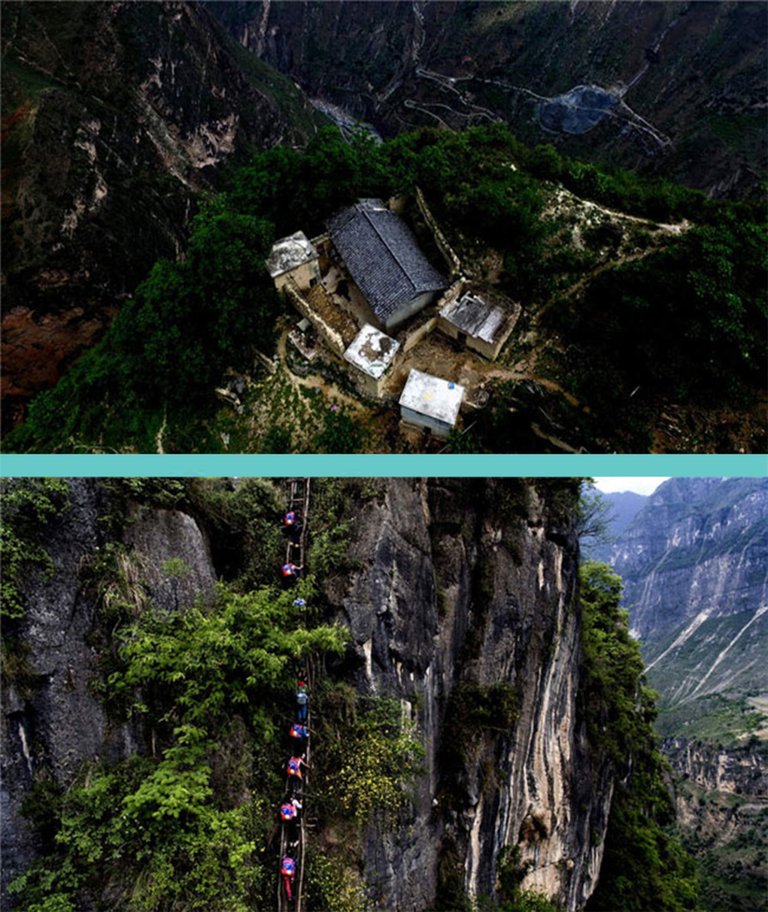A village of 8 thousand meters above the soil, the only medium of communication outside the inhabitants of the inhabitants is a tall ladder made of cane and rope. The people of the village have to survive by facing the difficult reality every day, where the light of modern civilization has not reached.
A village in Zhangzhou district of Liangshan subdivision area in southwestern Sichuan province of China. Name Atuli The mountains of the region, known as the durable area, have higher elevations than other areas. 72 families living in the village

There are 17 ladders hanging on different sides of the village to get down. The people of the village have to go through the ladder to get the work done daily. On the hillside of the village, they have to come to some of the high mountains in the lower level and they have to come to the plateau. At least eight people have been killed in nearby villages, according to villagers. Many people were injured in the ladders and others were injured.
China's policymakers should not 'know' the words of the people of this troubled life, not far from the world. In May 2016, a journalist named Chen Ji brought out many pictures of the village and published it in the title 'Village of the Country of the Country', the government came under the scanner of the village.
Every day 15 children in the village have risked their daily life to go to school under a ladder. Their primary school located in another hilly village below a low level.
After the news of the village was published in the media, the Chinese government pulled out. They started taking some initiatives to make the life of the village easier and safer. First of all, a long and sturdy steel ladder was built for the village.
Since the beginning of last year, some changes began to come to the village. A school is being built in that area at 300 million Chinese Yuan expenditures. Several budget plans have been taken to attract tourists. Even the village has been brought under the mobile Internet service. Presently electricity is being supplied in small scale. It will grow more in the next few months.
The village named Atulira is a great example of the poverty-stricken Liangshan area. China government has planned that if the tourist industry is developed in the area, the villagers will be evacuated elsewhere. Or they will work there as manpower for the tourism industry. Currently, there is a chance for tourists to go to the village. Tourists get access to the village's life on weekends and holidays.
China Daily said that there are at least 19 villages in this mountainous area on top of the hill. After writing about the government, the government has taken several steps to monitor the villages. All of these villages have about 3,000 students who have the opportunity to study from the school board.
Read more: Poverty win in flower farming
Currently, more than 20 villages in China develop their fortune by cultivating roses. This year, the targets of approximately 200-60 tonnes of high quality rose cultivation have been observed in these areas. Which will be used to make tea, oil, jams, and cakes of various companies.
Rose flower cultivation can be one of the sources of income, it has proved that people from different parts of China Residents of more than 20 areas of the country have turned poor by plowing flowers. Has become well-off.
Mao Shui village in the Sichuan province of southwest China, surrounded by green mountains. The majority of the inhabitants of the indigenous Tibetan and minority Qiang community. Instead of rabi grains and vegetables, roses are cultivated in the hills, and they are cultivating the rose flower. When their life is plentiful in the rainy season, this flower farming becomes a blessing for them.
The flower farmers said, "We used to do the crops that our forefathers used to cultivate." They used to eat the crops themselves and feed the rest to the livestock. There were no savings. But now we have had financial improvements by cultivating roses. Our annual income is more than $ 15,000.
In early 2012, the cultivation of roses began in the region by indigenous women named Chen Wanguai. Initially, villagers were not very careful about this but later started cultivating a large range of Chen's suggestion.
Entrepreneur Chen Wangui said, "I was surprised when a friend of mine told me that the oil made from rose extract is more expensive than gold. I said, not more than gold, it would be more profitable than potatoes and pulses. Then there is no initiative. Initially, they planted saplings in front of me, but due to lack of proper care, many plants died. After being understood, the work has been done. '
Congratulations! This post has been upvoted from the communal account, @minnowsupport, by nasim15 from the Minnow Support Project. It's a witness project run by aggroed, ausbitbank, teamsteem, someguy123, neoxian, followbtcnews, and netuoso. The goal is to help Steemit grow by supporting Minnows. Please find us at the Peace, Abundance, and Liberty Network (PALnet) Discord Channel. It's a completely public and open space to all members of the Steemit community who voluntarily choose to be there.
If you would like to delegate to the Minnow Support Project you can do so by clicking on the following links: 50SP, 100SP, 250SP, 500SP, 1000SP, 5000SP.
Be sure to leave at least 50SP undelegated on your account.
Thanks for using eSteem!
Your post has been voted as a part of eSteem encouragement program. Keep up the good work! Install Android, iOS Mobile app or Windows, Mac, Linux Surfer app, if you haven't already!
Learn more: https://esteem.app
Join our discord: https://discord.gg/8eHupPq